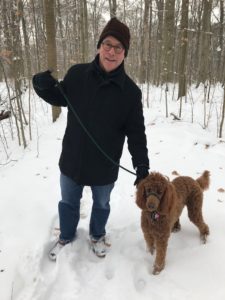Teaching via Zoom? You Can Do It With Your Eyes Closed
September 2, 2020 • 10 Comments • Posted in blindness, careers/jobs for people who are blind, teaching memoir, technology for people who are blind, writing promptsIn his guest post last week, Michael Graff said that when the idea of teaching memoir via Zoom first came up, “Beth was skeptical.” A very generous description there. Had I been editing his rough draft, it’d look like this :
Beth was skepticalstubborn.
Even before COVID, many people were suggesting I offer online courses in addition to in-person ones. “You could get people from all over the country,” they’d say. “You could charge a lot, and you wouldn’t even have to leave home.” Not leave home? Being with my writers is what I love most about teaching memoir. You’re right there, sensing the emotion from writers as they read personal essays out loud. As the class continues, you feel a certain trust develop in a room of people who once were strangers. You witness friendships growing.
Not leave home? Being with my writers is what I love most about teaching memoir. You’re right there, sensing the emotion from writers as they read personal essays out loud. As the class continues, you feel a certain trust develop in a room of people who once were strangers. You witness friendships growing.
”Thanks for the suggestion,” I told those computer-screen addicts back then. “It just won’t work for me.”
But they wouldn’t give up. “You can see everyone,” they’d continue, describing how an online class works. “You can watch their reactions right from home”
“But I can’t see!” I’d remind them. And that’s where the conversation would end.
But then, COVID happened.
When Wanda’s Wednesday class was cancelled in March, Sharon Kramer, a writer in that class and a graduate of the Beth Finke Memoir Teacher MasterClass, stepped up to the plate. She volunteered to teach her fellow writers how to use Zoom, and she’s been leading that class via Zoom ever since. I could hug her for keeping that class going.
Not now, though. Sigh.
Writers in two other classes I lead generously offered to stand in and lead classes via Zoom for me during COVID, too. Then Michael Graff (last week’s guest blogger) and his classmate Hugh Brodke lobbied to have me lead a trial Zoom class for Village Chicago. The trial class would be a good way to determine if it’s possible for people who are blind to teach using Zoom, they said. Writers could sign up to see if they’d like Zooming enough to commit to a six-week session.
I passed the audition.
Months later, I am leading three classes a week from home via Zoom. How does a person who can’t see manage to give writing prompts, interact with the writers, field questions, and keep tabs on who is (and isn’t) paying attention? Here’s how:
- Zoom has a dedicated accessibility team. Thanks to the efforts of people on that accessibility team, Zoom services are compatible with the standard screenreaders I use: VoiceOver on my iPhone, and JAWS on my PC
- When each writer arrives at the meeting, JAWS barks out their name in my headphone, a la “Alfred E. Newman has joined the meeting,” which allows me to keep track of who hasn’t arrived yet.
- Ditto when people sneak out early, as in “Alfred E. Newman has left the meeting.”
- I use keyboard shortcuts to mute and unmute myself.
- Most writers were in class when we were meeting in person, so I am familiar with — and can identify them by — their voices.
- Writers I have never met in person email their essays my way for editing before class, going over their written work ahead of time gives me an idea of who they are, and I’m learning to match their speaking voice with their writing voice.
- Limiting the essays to 500 words helps class, ahem, zoom by.
- Participants are far less likely to get bored or restless or make unnecessary noise when class zooms by like that.
- The high-quality headphones I use allow me to hear each writer clearly as they read their essays.
- The microphone attached to those headphones is high-quality, too, so everyone can hear me.
- Writers in my classes are not shy about telling me to raise or lower my screen so they can see my entire face rather than only my chin or forehead.
But if you want to know the real reason I’ve been successful leading Zoom classes, it’s this: a writer in each Zoom memoir class I lead volunteers to act as host and moderator. They set up the Zoom class, they know how to mute everyone in class while simultaneously unmuting the writer who is reading their piece, and can contact me in-between classes to rat out anyone who was taking a catnap or filing their nails or reading the paper or watching TV while a fellow writer was reading their essay. Writers in my Zoom classes: consider yourselves warned!
So a huge thank you to my hosts and moderators: Ellen Schweri, Regan Burke, and Michael Graff. I couldn’t do it without you. Zoom is working, yes, but I do look forward to sharing our stories in person again. And to that hug with Sharon, too.

